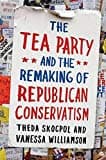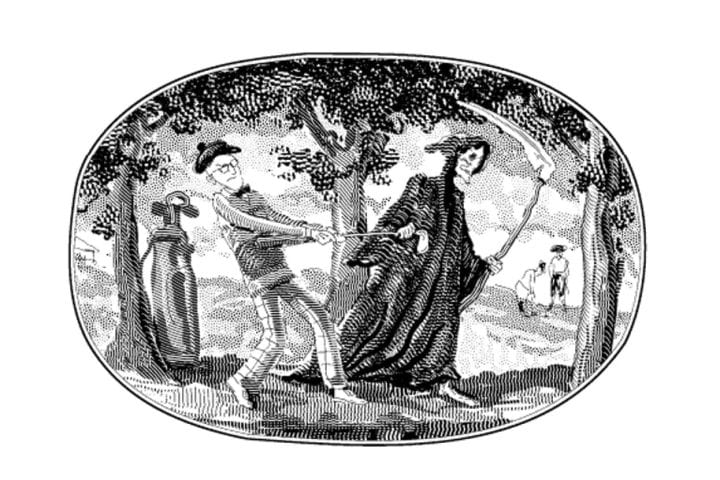Books Reviewed
A review of The Tea Party and the Remaking of Republican Conservatism , by Theda Skocpol and Vanessa Williamson
, by Theda Skocpol and Vanessa Williamson
The Tea Party and the Remaking of Republican Conservatism is an effort to reframe the debate over the Tea Party. Theda Skocpol and Vanessa Williamson are particularly intent on refuting journalists, such as the New York Times's Kate Zernike, who saw a strong libertarian streak in the movement's origins, and pollsters Scott Rasmussen and Doug Schoen, who argued that the Tea Party attracted a significant number of independents. The authors contend the Tea Party is nothing more than a direct extension of socially conservative Republicanism, one that came to life only when a Democrat took the White House.
To make their case Skocpol and Williamson have, remarkably, written a book on the Tea Party while virtually ignoring 2008 and 2009's wildly unpopular bailouts, stimulus, and giveaways to too-big-to-fail institutions, which fomented the movement in the first place.
This is no small omission. The first stirrings of what became the Tea Party appeared in the 2006 mid-term elections when independents and fiscally conservative Republicans deserted the GOP in droves, before doing so again in 2008.
When President George W. Bush and his Treasury Secretary Henry Paulson proposed the initial bailouts and TARP (the Troubled Asset Relief Program), the initiatives provoked an angry reaction. When those same programs were dramatically expanded under President Barack Obama and provided a rich bounty at public expense to AIG and Goldman Sachs, both of which played important roles in generating the financial crisis, the nascent Tea Party had obvious targets for its anger. Similarly, when the executives of Fannie Mae and Freddie Mac, key malefactors in the financial collapse, were handsomely rewarded, public ire increased.
None of this makes its way into the book. Skocpol and Williamson present themselves as the very models of scientific objectivity and detachment. "Make no mistake," they tell the reader, "we are social scientists; our research is carefully grounded in the best evidence we can find."
But both the book's concept and its method are flawed. Conceptually, the conclusion that the Tea Partiers are just a new incarnation of the 1964 Goldwaterites, prompted by the election of Obama, drives the argument. In a parody of what historians find risible about political scientists, the authors found no need to investigate the events of 2008 and 2009. Instead, they reasoned backward, from interviews they conducted in three states in 2010, to the origins of the Tea Party. During the 2010 election season, when Skocpol became interested in the Tea Party, questions of taxation, entitlements, and deficits were at the political forefront, eclipsing the earlier anger about the bailouts. Ergo, the 2010 issues must have been what created the movement in the first place.
After the book was written, Skocpol justified omitting the bailouts in a February 2012 Washington Post article. "Conservatives hate ‘government bailouts,' but in our interviews we rarely heard tea partyers [sic] condemn Wall Street capitalists for receiving them." Then again, strange to say, based on their presentation not a single interviewee uttered the epithet "crony capitalism" widely used by Tea Partiers.
* * *
Even had their concept and methodology not been so flawed, their inability to enter their subjects' mental world would have compromised their study's supposed scientific objectivity. The authors tell the reader they have made every effort not to condescend to Tea Partiers who are "Conservatives all, with political views very different from our views in our personal lives as citizens." They "found each person we spoke with admirable and likeable in his or her own way."
Yet they argued a few pages earlier that "national right-wing advocates and media stars are handing out a load of bull to grassroots Tea Party people, who accept outlandish claims," such as the unconstitutionality of Obamacare, "a bit too readily." And while Skocpol and Williamson attack Fox News and the Tea Parties for accepting the president's "purported" ties to ACORN (in fact, they're extensive and well documented), the authors tell us that institutions such as NPR "still follow twentieth-century norms of objectivity and balance in their coverage of politics."
The two scholars, who clearly expect the deference owed credentialed authorities—Skocpol is the Victor S. Thomas Professor of Government and Sociology at Harvard University and Williamson a Ph.D. candidate there—are dismayed by the Tea Party's insistence that self-government is both honorable and feasible. Tea Partiers embrace the dubious belief that the foundational documents of the American political system are accessible to laymen. The Tea Party ideal, an active citizenry that reads primary government documents first-hand without the guidance of priestly experts, is alien to the authors. Though Skocpol and Williamson seemed puzzled by this skepticism about legislators' good intentions, a good deal of modern legislation is made intentionally complex to allow interest groups to harvest a bounty from obscure provisions.
The one addition to the old-time Goldwaterite religion the authors do acknowledge is the response to illegal immigration, which they see as a victimless crime while the Tea Partiers reject it as an affront to citizenship and the rule of law. Thus, Skocpol and Williamson ascribe hypocrisy to Tea Party opposition to regulation and concurrent insistence that government control the borders.
* * *
Their main "gotcha," reliably disseminated by the New York Times and other liberal organs, is that Tea Partiers are hypocrites for benefiting from government payments while opposing higher taxes to finance programs like Obamacare. "Ironically, many organizers and leaders of local Tea Parties are supported in part by Social Security or veterans' pensions, and also enjoy health benefits from Medicare or veterans' health care programs." The limited government which Tea Partiers favor, wrote Timothy Noah in the New York Times, summarizing Skocpol and Williamson's argument, "is one where I get mine and most others don't get much at all." Leaving aside the accuracy of that statement, surely there's a distinction between contributory and redistributive programs.
The Tea Partiers' sense that the government has gone into business for itself and is now bankrupting the republic seems incomprehensible to scholars who believe they're studying a political phenomenon objectively and fairly. The clash between the authors' faith in government and their subjects' day-to-day experience with government failure means that for all Skocpol and Williamson's scientific pretensions, their book will impress only readers who come to it with disdain for the Tea Party movement. That, after all, is what the authors did.





